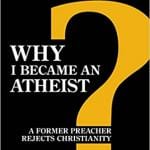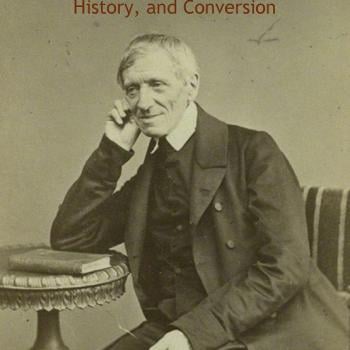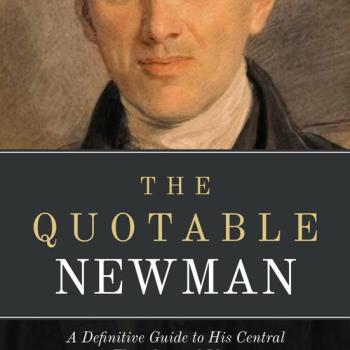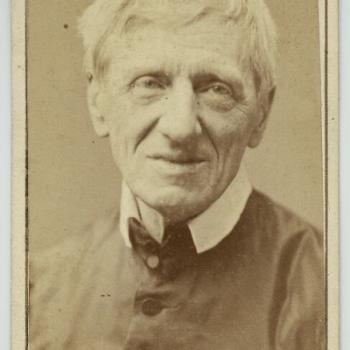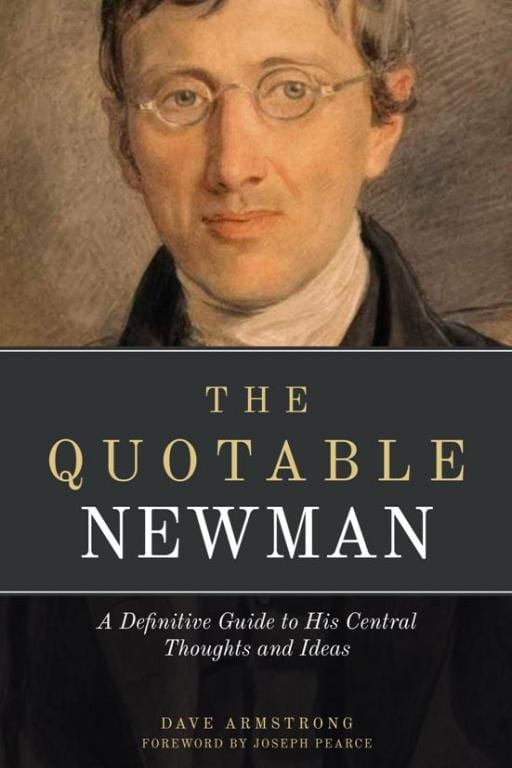
[book and purchase information]
Everyone has axioms that they can’t absolutely prove, by definition. That goes for atheist, nominalist, realist, pedestrian, blue-eyed, left-handed moth catcher, everybody. My epistemological position is that nothing can be proven absolutely, in a purely philosophical, logical sense, but that one can have a certitude of faith. I think that would be a supposition common to both Newman and a presuppositionalist.
Cardinal Newman’s theory is a helpful paradigm for understanding development, which is only one aspect of Church history. Personally, I think it is very helpful and important for Protestant-Catholic discussion. Development itself I take to be self-evident. Newman’s theory is one way to look at development. It happens to be the classic treatment, as acknowledged by Protestant as well as Catholic scholars.
Newman explains the basic epistemological and evidential nature of his theory in his Essay on the Development of Christian Doctrine (Introduction, section 21: all emphases added):
The following Essay is directed towards a solution of the difficulty which has been stated, – the difficulty, as far as it exists, which lies in the way of our using in controversy the testimony of our most natural informant concerning the doctrine and worship of Christianity, viz. the history of eighteen hundred years. The view on which it is written has at all times, perhaps, been implicitly adopted by theologians, and, I believe, has recently been illustrated by several distinguished writers of the continent, such as De Maistre and Mohler: viz. that the increase and expansion of the Christian Creed and Ritual, and the variations which have attended the process in the case of individual writers and Churches, are the necessary attendants on any philosophy or polity which takes possession of the intellect and heart, and has had any wide or extended dominion; that, from the nature of the human mind, time is necessary for the full comprehension and perfection of great ideas; and that the highest and most wonderful truths, though communicated to the world once for all by inspired teachers, could not be comprehended all at once by the recipients, but, as being received and transmitted by minds not inspired and through media which were human, have required only the longer time and deeper thought for their full elucidation. This may be called the Theory of Development of Doctrine; and, before proceeding to treat of it, one remark may be in place.
Orthodox and Anglicans would have the same general view on doctrinal development. But one must accept apostolic succession and believe that nothing can radically change doctrinally, using the standard of the apostolic deposit left for us to preserve. If a doctrine fundamentally changes, or is discarded, that is evolution or revolution, respectively, not development. One cannot believe in a mass apostasy (the standard anti-Catholic Protestant, or Mormon, or Jehovah’s Witness view), because that contradicts indefectibility, which is a premise of development of doctrine.
We must compare competing notions of development, and see which one is more plausible, given the facts presented. In my fourth book, I had a “dialogue” with Orestes Brownson, a Catholic convert, who disputed Newman and seemed to think his development was evolution. I hear the same occasionally from “traditionalists.” One of the enduring myths about Newman was that he was a modernist.
[Newman] It is undoubtedly an hypothesis to account for a difficulty; but such too are the various explanations given by astronomers from Ptolemy to Newton of the apparent motions of the heavenly bodies, and it is as unphilosophical on that account to object to the one as to object to the other. Nor is it more reasonable to express surprise, that at this time of day a theory is necessary, granting for argument’s sake that the theory is novel, than to have directed a similar wonder in disparagement of the theory of gravitation, or the Plutonian theory in geology. Doubtless, the theory of the Secret and the theory of doctrinal Developments are expedients, and so is the dictum of Vincentius; so is the art of grammar or the use of the quadrant; it is an expedient to enable us to solve what has now become a necessary and an anxious problem. For three hundred years the documents and the facts of Christianity have been exposed to a jealous scrutiny; works have been judged spurious which once were received without a question; facts have been discarded or modified which were once first principles in argument; new facts and new principles have been brought to light; philosophical views and polemical discussions of various tendencies have been maintained with more or less success. Not only has the relative situation of controversies and theologies altered, but infidelity itself is in a different, – I am obliged to say in a more hopeful position, – as regards Christianity.
If the liberals and modernists insist on doing a hatchet job on Christian history with their so-called “higher criticism” and so forth, then it is incumbent upon Christians to present an alternate Christian view of history. That goes all the way back to Augustine and Eusebius. One can have varying interpretations of history, as it is subjective and dependent upon how one organizes and views its events. So Newman offered up a hypothesis and tested it by facts to see if it worked. It did. Just as Butler turned deist analogical reasoning against the deists, turning the tables, so Newman used Church history in reply to secularists and Protestants alike (eventually even against the Anglican via media).
[Newman continues] The facts of Revealed Religion, though in their substance unaltered, present a less compact and orderly front to the attacks of its enemies now than formerly, and allow of the introduction of new inquiries and theories concerning its sources and its rise. The state of things is not as it was, when an appeal lay to the supposed works of the Areopagite, or to the primitive Decretals, or to St. Dionysius’s answers to Paul, or to the Coena Domini of St. Cyprian. The assailants of dogmatic truth have got the start of its adherents of whatever Creed; philosophy is completing what criticism has begun; and apprehensions are not unreasonably excited lest we should have a new world to conquer before we have weapons for the warfare. Already infidelity has its views and conjectures, on which it arranges the facts of ecclesiastical history; and it is sure to consider the absence of any antagonist theory as an evidence of the reality of its own.
If we are to be salt and light to our culture, we must meet it on its own ground. That’s what a wise apologist or spokesman of Christianity tries to do. We are to be in the world, and attempt to transform it by all means at our disposal, but not of the world. That has always been the trick to achieve for Christians who are not hermits or drop-outs from society-at-large. We are to be, like Paul, “all things to all people” that we might “win” them. He meant, of course, to adopt methodological tactics which the recipient can understand from within their own paradigm. That’s precisely what Paul did on Mars Hill in Athens.
Adopting similar ways of arguing, taking into account the opponents’ paradigm, so as to better reach them, and actually adopting the competing paradigm are two different things. Newman does nothing unChristian in arguing the way he does.
[Newman] That the hypothesis, here to be adopted, accounts not only for the Athanasian Creed, but for the Creed of Pope Pius, is no fault of those who adopt it. No one has power over the issues of his principles; we cannot manage our argument, and have as much of it as we please and no more. An argument is needed, unless Christianity is to abandon the province of argument; and those who find fault with the explanation here offered of its historical phenomena will find it their duty to provide one for themselves.
Newman’s theory was nothing essentially new. It contained no concept that was not already set forth in some fashion by St. Augustine, St. Vincent of Lerins, and St. Thomas Aquinas. Yet people like Dr. James White and the 19th century Anglican controversialist George Salmon have claimed that Newman “came up with” the theory out of mid-air; made out of whole cloth (in order, of course, to special plead for the absurdities of Catholic corruptions and screwing around with the historical data). This is manifestly false. Newman’s genius was in the application of his more explicitly formulated theory to many, many facts of Church history, considered in order to test the claims of the “expedient hypothesis.” No one else had ever made such a wide-ranging argument, seeking to incorporate and explain so many divergent facts of doctrinal development and history of theology.
Also, he was unique in that he made much use of analogy. That comes straight from his high regard for Anglican Joseph Butler’s Analogy of Religion (1736), the classic work of apologetics, considered by many to be one of the best apologetic works in Christian history. The skeptic philosopher David Hume thought it was the best defense of Christianity he had read. Baptist theologian Bernard Ramm writes at length about Butler’s Analogy:
In philosophical background he was deeply committed to Locke . . . Locke was famous for his attack on the notion of innate ideas . . . Butler’s attack on deism was then a sort of within-the-camp attack . . . by accepting Lockian epistemology and the deist’s theory of analogy Butler enters within their camp and by hand spikes their guns. So capable, so thorough, so devastating was Butler’s attack upon deism that no real formal answer was ever made . . . Cardinal Newman was also much impressed with the Analogy and believed Butler to be the most authoritarian voice in Anglican theology . . .Butler placed himself within this Lockian empirical tradition with its emphasis upon limitation of knowledge . . . Butler renounced both rationalism and idealism and cites Descartes as an example of a philosopher resting his case upon hypotheses, i.e., upon unverifiable contentions . . . He defends a strict empiricism and a strict inductionism. It is a system which attempts to make both theology and apologetics vigorously empirical and deductive contrasting sharply with any speculative approach to these two areas . . .
Butler follows the pathway of common sense, a reserved agnosticism, and a rejection of speculative metaphysics. He seeks to ground religion – to use a recent expression – in brute fact. He is against Plato, Augustine and Thomas in so far as Thomas represents a speculative metaphysics. The ultimate data of religion must be of the same stuff as the ultimate data of science. It must be that sort of stuff which has unquestionable authority to the man of common sense . . .
Butler is telling the world that there is no a priori knowledge of God that is coercive. God’s existence and ways are to be deciphered from His handiwork, and our conclusions are not absolutes but probability statements . . . According to Butler no absolute proof for anything exists [my own position of long standing]. The prudential man acts on the slope of the evidence, and when he detects the direction towards which the evidence slopes he acts accordingly . . .
His apologetics proper is built upon the combined principles of probability and analogy, although he does warn us that the proof of Christianity is essentially the total impact of the evidence. Probability provides the grounds for action and analogy the direction. (Varieties of Christian Apologetics, Grand Rapids, Michigan: Baker Book House, 1962, 107, 109-113, 116)
The profound influence of Butler on Newman is rather obvious, and well-known. His style and outlook pervades the Essay on Development and his philosophical work, Grammar of Assent. Mentions of Butler are numerous. Thus Newman’s theory is not within the rationalistic tradition, but the empirical one, as with Butler.
Newman’s theory is but one schema. I think it succeeds, and I will hold to it until someone refutes it and shows me something better. It is far more history than philosophy (somewhat like Augustine’s in his City of God). It is a “lens,” but a lens can’t change the facts of history themselves; only, perhaps, in how they are arranged or organized, and what they tell us, just as, e.g., Stephen’s sermon before he was stoned gave a Christian interpretation of salvation history. We don’t say that is “philosophy.”
Newman’s development was philosophy primarily in the sense of methodology: analogy and falsifiability. Both of those concepts are biblical, however: parables are analogies, and eyewitness claims of the Resurrection lend themselves to falsifiability: the Jews only had to produce the body of Jesus to overcome it. His theory is not an axiom, but an hypothesis to account for the facts of Church history, as he states.
Newman starts with the same presuppositionalist axiom that every Christian begins with, if they think through the issues properly and long enough. Here are some examples of Newman’s axioms, in his Grammar of Assent:
Now certainly the thought of God, as Theists entertain it, is not gained by an instinctive association of His presence with any sensible phenomena; but the office which the senses directly fulfil as regards creation that devolves indirectly on certain of our mental phenomena as regards the Creator. Those phenomena are found in the sense of moral obligation. As from a multitude of instinctive perceptions, acting in particular instances, of something beyond the senses, we generalize the notion of an external world, and then picture that world in and according to those particular phenomena from which we started, so from the perceptive power which identifies the intimations of conscience with the reverberations or echoes (so to say) of an external admonition, we proceed on to the notion of a Supreme Ruler and Judge, and then again we image Him and His attributes in those recurring intimations, out of which, as mental phenomena, our recognition of His existence was originally gained. And, if the impressions which His creatures make on us through our senses oblige us to regard those creatures as sui generis respectively, it is not wonderful that the notices, which He indirectly gives us through our conscience, of His own nature are such as to make us understand that He is like Himself and like nothing else.
I have already said I am not proposing here to prove the Being of a God; yet I have found it impossible to avoid saying where I look for the proof of it. For I am looking for that proof in the same quarter as that from which I would commence a proof of His attributes and character, – by the same means as those by which I show how we apprehend Him, not merely as a notion, but as a reality. The last indeed of these three investigations alone concerns me here, but I cannot altogether exclude the two former from my consideration. However, I repeat, what I am directly aiming at, is to explain how we gain an image of God and give a real assent to the proposition that He exists. And next, in order to do this, of course I must start from some first principle;- and that first principle, which I assume and shall not attempt to prove, is that which I should also use as a foundation in those other two inquiries, viz. that we have by nature a conscience.
I assume, then, that Conscience has a legitimate place among our mental acts; as really so, as the action of memory, of reasoning, of imagination, or as the sense of the beautiful; that, as there are objects which, when presented to the mind, cause it to feel grief, regret, joy, or desire, so there are things which excite in us approbation or blame, and which we in consequence call right or wrong; and which, experienced in ourselves, kindle in us that specific sense of pleasure or pain, which goes by the name of a good or bad conscience. This being taken for granted, I shall attempt to show that in this special feeling, which follows on the commission of what we call right or wrong, lie the materials for the real apprehension of a Divine Sovereign and Judge.” (Chapter Five, section 1: “Belief in One God”)
This is a sort of moral argument for God’s existence. But Newman is presupposing all along that this knowledge is innate, put there by God. He would disagree with Locke’s tabula rasa. He thinks that God put these notions or affinities within us, just as the presuppositionalist does.
It is interesting to read the Introduction to this work (Doubleday Image edition) by the eminent Thomist Etienne Gilson:
The third and last mistake to avoid in interpreting Newman’s doctrine is to see it as a rational probabilism redeemed by a belated appeal to religious faith . . . this Essay . . . is precisely and exclusively about our assent to that kind of truth which, because it is accepted on the strength of the word of God alone, cannot possibly be received otherwise than by religious faith. Here again, let us not attribute to Newman a fideism entirely foreign to his authentic thought. He knows very well that we cannot assent to a proposition unless we have some intelligent apprehension of its meaning; only, because the Grammar of Assent is about religious dogma, the propositions which it discusses are not susceptible of proof properly so called. Newman himself makes this clear at the very beginning of his book: ‘In this Essay I treat of propositions only in their bearing upon concrete matter, and I am mainly concerned with Assent; with Inference, in its relation to Assent, and only such inference as is not demonstration: with Doubt hardly at all” (p. 28). The importance of the effort pursued by reason, even in matters whose very nature excludes demonstration, could not be overlooked by Newman. It was at the very core of his subject. (p. 15)
There is no concept of “thesis” and “antithesis” in Scripture. There is one Apostolic Tradition, and it doesn’t change. Change is anathema to the notion of both Tradition and development (not to mention the Vincentian canon). Church historian Philip Schaff’s view on development, then, appears to be a species of the liberal, modernist idea of “evolution” of dogma, rather than development. In his schema (if I understand it correctly), doctrines can actually change into something else, and not be traced back in an unbroken succession to the apostles (which is what happened with Protestantism when it differed from received tradition).
I don’t think this can be squared with the Bible or the Fathers’ outlook at all. It is the heretical principle of authority: innovation might be the “new” truth because that is how “the Spirit is progressing,” etc. This strikes me as the theological version of legal positivism, whereby the Constitution evolves due to cultural conditions, increased knowledge, and so forth; or the old Calvinist postmilleniallism, secularized into the Idea of Progress (which even made its way into evolutionary thought). That cannot be synthesized with the “faith once delivered to the saints” (Jude 3).
Newman operated in modes of thought and paradigms quite different from the Thomist ones. To the extent that he utilizes a sort of “psychological” criterion for truth and falsehood he is more closely approximating nominalist modes of thought, where the individual is more key than the universal concepts. So his whole notion of the “illative sense” and certitude and assent, etc., is a very different way of approaching religious truth claims than Aquinas would have taken. Pope St. John Paul II — like Newman — works through the issue of epistemology in an “inclusive” fashion, trying to weave together different strands. I am very much in the same general disposition.
Christianity is not bound to any one philosophy. That would place philosophy higher than Christianity, or faith, or revelation, and that is what I vehemently oppose, because it makes theology the handmaiden of philosophy, rather than vice versa, and possesses the danger of reducing Christianity to philosophy altogether, so that it would become something akin to deism or Unitarianism, as we know and love that denomination today. Newman’s theory can also be falsified. One need only demonstrate an alternate historiographical framework.
One must also have faith, with regard to doctrinal development, as with Christian faith in general. The Catholic is not like the Protestant: ever uncertain, ever tentative and unsure whether their denomination might be wrong on this and that; always searching; on a perpetual quest that never seems to be able to be fulfilled. By its very nature, Protestantism doesn’t offer certainty. Catholics look at it very differently. We believe in faith that Jesus established one visible Church and protected it from error through the centuries, and that the Catholic Church is that one Church; while not excluding other Christian groups altogether, as also parts of the Church in some fashion.
We believe this in faith. Faith cannot be proven under a microscope, but we think we can plausibly back our views up from Scripture, history, and reason, alike. That’s all anyone can ask of any view. Whether it is true or false has to be shown by refuting its claims and/or offering better ones in its place. I’ve only become more and more confident in my work as an apologist, which is the blessing of apologetics: we strengthen our own faith a great deal in trying to help others to strengthen theirs.
***
Related Reading
How Newman Convinced me to Become a Catholic [1996]
Importance & Influence of Blessed Cardinal Newman [5-22-03]
Cardinal Newman’s Philosophical & Epistemological Commitments [10-19-04]
The Certitude of Faith According to Cardinal Newman [9-30-08]
The Quotable Newman (Dave Armstrong): Foreword by Joseph Pearce [9-5-12]
Books by Dave Armstrong: The Quotable Newman, Vol. II [8-20-13]
Books by Dave Armstrong: Cardinal Newman: Q & A in Theology, Church History, and Conversion [2-24-15]
Introduction to my book: Cardinal Newman: Q & A in Theology, Church History, & Conversion [5-23-15]
Blessed John Henry Cardinal Newman: “Father” of Vatican II (Old Links Page) [4-18-16]
St. John Henry Cardinal Newman on Apologetics [11-19-20]
***
(originally uploaded on 1 October 2002; revised on 4 December 2002)
***
Summary: St. John Henry Cardinal Newman’s theory is the classic paradigm for understanding doctrinal development, which is demonstrably & historically inevitable for all Christian doctrines.
***


